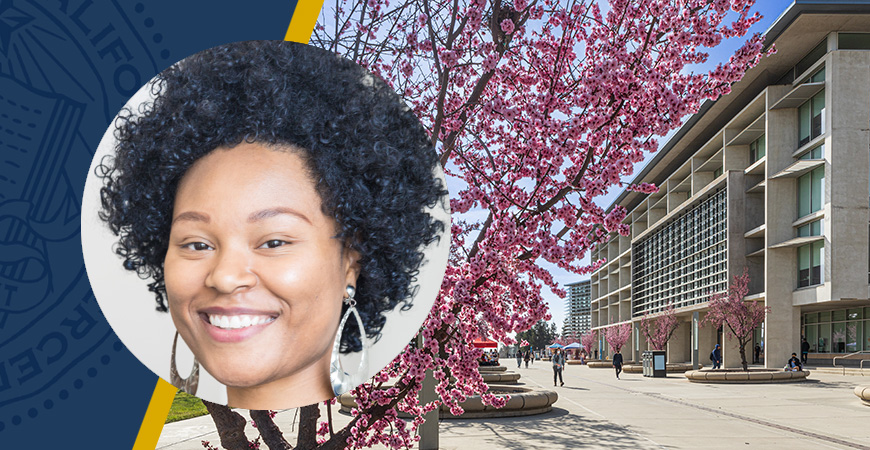
Professor Maria Martin has a lot going on.
On Feb. 18, she was the grand marshal and a speaker at a program and march honoring the Rev. Dr. Martin Luther King Jr. in downtown Merced.
This weekend, she and the university will host a two-day gathering that investigates Black identity from multiple points of view and contexts. Martin was the driving force in creating the UC Merced Global Africana Studies Research Conference.
The Black Alliance, a university organization Martin founded, advocates for Black faculty, staff and students while, just as importantly, building meaningful connections between the young campus and its surrounding community.
And, of course, she is a teacher and researcher. A professor with the Department of History & Critical Race and Ethnic Studies, she embraces the responsibility of helping students shed hidebound beliefs and allow lessons of the past to illuminate their perspective on today’s racial and cultural struggles.
“I’m trying to make sure I leave a legacy of honor and integrity,” said Martin, a native of Cleveland who earned a Ph.D. in African American and African Studies at Michigan State University. “There is a lot of room for me to have influence and impact, and I want to maximize my impact.”
Calling on her faith, she paraphrases Acts 10:38, saying she wants to “go around doing good.”
Martin arrived at UC Merced in summer 2018. She was slated to start here a year earlier but instead grabbed an opportunity to be a Fulbright visiting scholar at the University of Ibadan in Nigeria. There, she taught a graduate course in gender studies and developed a mentoring program for students. She returned to the States and alighted in the Central Valley with lessons she still applies to her work. She calls it humanistic teaching.
I’m trying to make sure I leave a legacy of honor and integrity.
At the midpoint of a semester, she and her teaching assistants will sit down with students who appear to be struggling. They will ask: What’s happening in your life? What’s important to you now? What might be affecting your performance in the course? Martin and her aides will suggest resources and create a “success plan” with the student that sets goals and dates.
Martin said the need for this approach hit home in West Africa when she realized many of her students might lose power at their homes for days at a time or simply have difficulty traveling to the university.
“So, I try to build this support in my classes,” she said, “and that is a direct impact and result of my teaching in Nigeria.”
Another experience – one that rocked a nation – spurred the creation of the Black Alliance. The killing of George Floyd Jr. in the custody of Minneapolis police in May 2020 brought together dozens of Black staff, students and faculty looking for ways to channel their horror, anger and grief. The Alliance was established that June to provide a unified voice for people in the campus community. Just a month later, the group created an Accountability Unit that brings the Alliance’s concerns directly to the chancellor, provost and chief diversity officer.
The Alliance, true to its name, has formed partnerships with organizations and Black-owned businesses and services in the Merced area. It has secured about $65,000 via College Corps fellowships for Black undergraduates working with community partners. Members have suggested Black doctors who could contribute to an inclusive curriculum for UC Merced’s new medical education program.
UC Merced’s efforts to establish its place in the Valley is a challenge for a research university that broke ground only two decades ago, miles from the city’s center. The Black Alliance has put a premium on meeting with residents, developing community liaisons who are invited to Alliance meetings, and telling people “we want them to have a voice in what we’re doing,” Martin said. “We want their youth to come here and be educated here.”
Speaking of education, Martin has a first stage to her courses that prepares students for the knowledge to come. For the first couple of weeks, the classes focus on what students think about Africa or how they perceive Blackness. What pre-conceptions might they bring to the table?
“We have some in-depth conversations,” she said, “to deconstruct what they may have learned. Then they have a better chance of not ‘other-izing’ the people we’re going to learn about.”
Martin said this reset helps students look past color or culture and focus on principles. It leads them to more penetrating questions.
“Now they have a better chance of having tools that will help them say, ‘Oh, wait a minute. Let me check that thinking,’ or, “This is something I need to investigate deeper.’”






